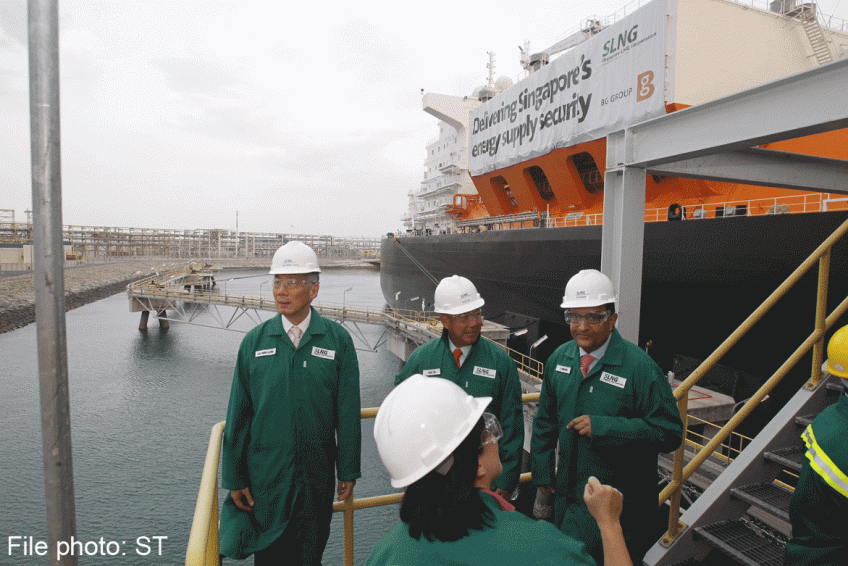Bright prospects for LNG bunkering

THE stability of modern Singapore as a nation has always rested on clear economic and societal principles, and the state's ability to identify the imperatives of governance to ensure successful guidance.
These include the need for good and proactive leadership, the necessity to optimise available resources, to adapt relentlessly and remain relevant in a fast-changing world, and continually re-examine its pivotal role in the region and the world at large.
A typical example of Singapore following the high standards it has set itself lies in the evolving energy world and the nation's responsibility to meet its own requirements.
Only 10 years ago, a disruption of natural gas import flow caused interruption to electricity supply (https://www.ema.gov.sg/news/view/66) resulting in the loss of 30 per cent of power systems for approximately two hours. Although dependability was enhanced, this did not meet with the key principles of governance for which Singapore was uniquely and justifiably renowned.
With such a high standard of governance at stake, Singapore engaged decisively and proactively. The main factor to focus on was reliability of supply. In 2006, the Singapore government said it planned to eradicate supply issues by importing LNG and constructing the nation's very first LNG Receiving Terminal. With such aspirations, Singapore could apprehend growing demand and broaden its horizons via supplementary natural gas sources.
An independent company was originally contracted to develop the LNG Terminal. However, due to the global financial crisis, financing became problematic. Further illustrating its positive, proactive philosophy, the Singapore government announced that to avoid subsequent delays it would take over responsibility and ownership. As a result, the Singapore LNG Corporation was established under the government's funding to build, own and operate the LNG Terminal.
In February, 2014, after approximately nine months of successful operations, Prime Minister Lee Hsien Loong officially opened Singapore's first LNG Terminal. Ambition and adherence to sound economic and societal principles allowed Singapore to import global LNG supply, thus safeguarding the nation's security of supply to meet current and future energy demands.
Singapore has a great legacy as an oil trading hub and, with a sound understanding of the market, it recognised the strong potential to benefit from Asia's rising gas demand.
This was validated when the Fukushima nuclear disaster struck Japan and the majority of domestic nuclear plants were shut down. This led to a substantial increase in the need for LNG as an alternate fuel source. As expected, many of the foremost energy trading firms settled in Singapore, including associated supporting banking establishments and specialised service groups.
So what does the future hold for Singapore and LNG? With the growing potential for LNG as a marine fuel, Singapore has become the leading Asian nation to develop a main LNG bunkering hub. The bunkering industry is placing more focus on LNG as a cleaner and more commercially feasible alternative fuel. As well as being a key oil trading hub, Singapore now also holds the top spot as the global bunkering port. With its own LNG supply capacity, it is looking to take full advantage of regional need for LNG bunkering.
So what of the competition? With any new venture and ambition, Singapore will face challenges to become the foremost LNG trading hub. The challenges come from areas such as shale gas developments in the United States and subsequent export facilities. This will of course impact on global LNG trading routes. Time will tell what effect it will have for Singapore.
To further acknowledge the effectiveness of the Singapore government and its ability to continually adapt,investment has been placed in Cheneire's Sabine Pass LNG Export Plant to capitalise on the increase in US secure and cheap gas. Time will tell if the US supply will in fact be directed to Singapore, or if higher major gas importers, Japan and South Korea, will dictate demand. The ease of supply from the US to the Asian market is due to the expansion programme on the Panama Canal - this being a direct transportation route to Japan and South Korea.
The naturally occurring downside of success, as Singapore has seen with its involvement in LNG, is the increase in competition from other established Asian regions, most of which are similarly looking to establish comparable LNG trading hubs. South Korea and Japan have already recognised the required infrastructure, such as the storage tanks and related facilities, essential to trade LNG.
In Malaysia, aspirations are visible as the government seeks to complete its own LNG import terminal. This will be used for storage, loading and regasification of LNG, and is also designed for both the import and export markets. In addition, Malaysia is set to unveil the world's first regasification unit on an island jetty located in Malacca.
But despite facing increased competition from other markets in the region, a history of stability allows for Singapore's ongoing commitment to establish itself as the pre-eminent LNG trading hub. Its objective, to continue to attract significant levels of public and private investment in this rapidly evolving sector, will rest on its core economic and societal values and principles. These are exemplified by the fact that expansion plans are already in the pipeline, with main emphasis on the potential of providing to numerous LNG Terminal consumers (such as LNG Trading, Bunkering, LNG Carrier Post-Dock/New-Build Delivery Cool-Down operations, etc.) This vision should allow rapid and effective development. The tangential benefits are obvious: new business creation, new jobs, and increased overall national self-appreciation.
With a very strong safety record in the LNG sector, Singapore places great significance on ensuring high reliability and, as importantly, highly trained and able professionals working in the sector. The provision of such a capable, high-calibre workforce is one area in which Singapore has few, if any, competitors.
The writer is marine engineering and LNG consultant, London Offshore Consultants (LOC), Singapore

Get The Business Times for more stories.